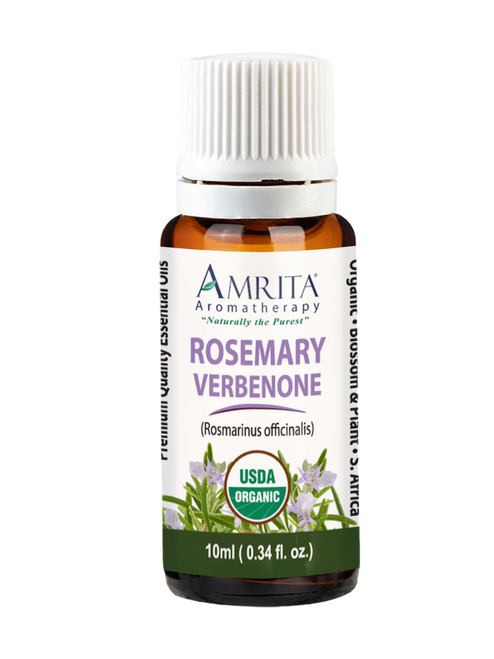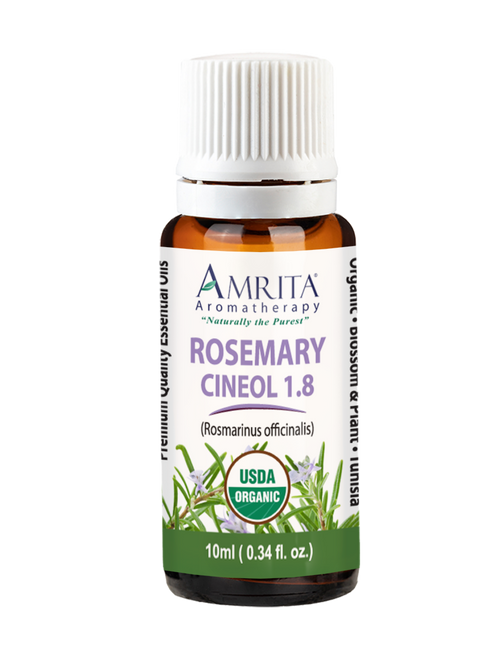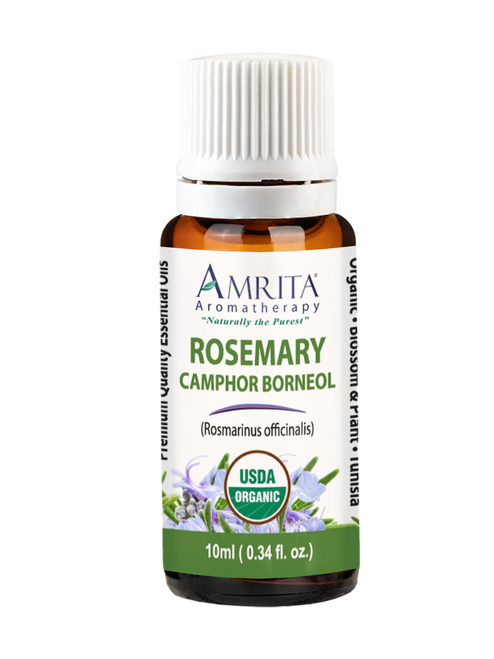- Other Names
- Pinene, Camphene, and Bornyl Acetate
- Farming Method
- Certified Organic
- Plant Part
- Blossom and Plant
- Country of Origin
- South Africa
- Application Method
- Bath, Diffusion, Inhalation, Massage, and Topical
- Scientific Name
- Rosmarinus officinalis
- Extraction Method
- Steam Distilled
Rosemary Verbenone Organic Essential Oil is said to be the most gentle, non-irritant Rosemary. Rosemary is also an excellent tonic for the liver and gall bladder, as well as the treatment of gall bladder infections, biliary colic and gall stones due to containing at least 5% of a compound called verbenone.* Amrita’s Rosemary Verbenone has 10% verbenone. It also helps lower high blood sugar and is an aid for arteriosclerosis.*
It is an excellent tonic of the central nervous system, mental clarity, and mental awareness.* It is an excellent brain stimulant and a history of assisting memory.* Psychologically, rosemary can renew enthusiasm and bolster self confidence.*
Rosemary Verbenone can be added to diffusers for sinus and respiratory support, as well as to encourage mental clarity.* It can also be added to vapor rubs, smelling salts, oils, baths, steam baths and direct palm inhalation for the same purposes.*
About the Plant:
A shrubby evergreen bush, Rosemary grows up to 6 feet high. It has silvery-green, leathery, needle-shaped leaves and small tubular, pale blue flowers. The shrubs prefer growing in sunny well drained soil although adapt to most conditions and can be grown as a low border in a formal garden. The name “rosemary” means “rose of the sea,” referring to its native habitat, the sandy Mediterranean coastline. Rosemary loves dry heat: the hotter and drier the climate, the stronger its penetrating aroma.*
As rosemary is highly aromatic, it is not troubled by pests and diseases. This is why Rosemary has such a wide range of culinary and medicinal uses; Rosemary is also used to fragrance soaps, cosmetics, detergents, and perfumes.
Rosemary Verbenone and Rosemary Cineol share many of the same therapeutic properties and are used interchangeably or together. Rosemary Verbenone, is better as a tonic for liver and gall bladder than its counterpart, Rosemary Cineol, which is better for promoting circulation, a healthy respiratory system and a healthy digestive system.*
Where It Grows:
Rosemary is a shrub that originated in the Mediterranean region. Rosemary Verbenone grows wild on the island of Corsica and Morocco. It is cultivated in a few other countries, among them South Africa.
Traditional Uses and Lore:
Rosemary is believed to be one of the earliest plants used for cooking and medicine. The ancient Egyptians favored it and traces of it has been found in the first dynasty tombs.* Rosemary was burnt as ritual incense and placed in the Pharaoh’s tombs to help them remember their former life.* This is why Rosemary is the herb known as a symbol of remembrance.*
It’s is said that Greek scholars placed rosemary wreaths on their heads to increase their power of concentration before exams.* Dioscorides recommended it as a powerful remedy for stomach and liver problems.* Hippocrates said rosemary should be cooked with vegetables to overcome liver and spleen disorders and Galen prescribed it for jaundice.*
To the Greeks and Romans, it was considered a sacred plant. They believed rosemary symbolized love and death.* The Greeks and Romans wove rosemary twigs into their wedding crowns and bouquets as a symbol of love and constancy, and burnt it as incense at funerals in respect and memory of the dead.* In the Middle Ages, it was burned to drive away evil spirits, to protect against plagues, and used to freshen and purify the air in French hospitals.*
First distilled in the 13th century, the Essential Oil of rosemary was an important ingredient in a number of eau de colognes.* Isabella, Queen of Hungary, had much to do with rosemary’s reputation as a rejuvenating tonic.* Her famous Royal Hungarian Water is made by distilling rosemary, lavender, rose petals, orange flower and lemon balm.*
Other Facts:
-
-
- Scent: Intense, Balsamic, Herbal, and Dry Aroma
- Fragrance Note: Middle Note
- Composition: Verbenone, α-Pinene, Cineol, and Camphor.
- Family: Lamiaceae Family
-
*These statements have not been evaluated by the Food and Drug Administration. These products are not intended to diagnose, treat, cure, or prevent any disease.
- USDA Certified Organic
- Aids Liver Health
- Supports Hair Growth
- Opens Inflamed Airways
- Click here to read Amrita's blog: All About Rosemary Verbenone Organic Essential Oil
- Check out the tabs below to learn more about Rosemary Verbenone
Topical Application (for use on the skin):
|
||
|
|
||
|
|
Diffusion / Inhalation (add a few drops to a nebulizer or nasal inhaler):
|
|
Blends Well With:
- Black Pepper, Cajuput, Lemongrass, Lemon, and Peppermint
-------------------------------------------------------------------------------------------------------------------------------------------------------------------
Safety Precautions:
-
- Rosemary Verbenone is non-toxic, non-irritant (when properly diluted), and non-sensitizing.*
- Avoid use if you have epilepsy, high blood pressure or are pregnant.*
- Rosemary Essential Oil should not be used on children who are 3 years of age or younger.*
- Rosemary Verbenone is non-toxic, non-irritant (when properly diluted), and non-sensitizing.*
General Safety Precautions:
-
- Use Essential Oils only in diluted form on the skin and never internally.
- Always be careful when using Essential Oils with children.
- Give them only low doses, or better, consult a qualified aromatherapy expert before using.
- Also, use Essential Oils with care and only under the proper guidance of an expert while pregnant or if you have liver damage, epilepsy, cancer, or other serious health problems.
*These statements have not been evaluated by the Food and Drug Administration. These products are not intended to diagnose, treat, cure, or prevent any disease.
Rosemary Verbenone possesses much of the same fortifying, uplifting qualities as common Rosemary Cineol 1.8 but is more gentle, calming, and soothing.* The distinctive and wonderfully fresh, herbal aroma of Rosemary refreshes the senses and provides a host of therapeutic benefits.* Rosemary Verbenone is known for its cell-regenerative powers.* It helps regenerate the liver and can help regenerate other tissues.*
Rosemary is commonly found in hair care products, as it is reputed to renew hair growth and prevent premature baldness.* It has been used in the treatment of dandruff and oily skin and scalp.* It is known to have a positive effect on the cephalic regions, clearing the mind as well as improving memory and overall brain function.*
Rosemary contains camphor, which can help improve circulation and respiratory function.* It can help tone the heart by circulating the blood to restore and relax nerves.* The camphor helps disperse the heat from infection that may be present in coughs from cold or flu.* Therapeutically, Rosemary Oil can be used to promote blood flow to the pelvic region and uterus and support the digestive system.* This is why Rosemary is known as a diuretic and an expectorant/decongestant.*
In summary: you should use Rosemary Verbenone in conditions that have symptoms of heat, and the warmer more common Rosemary Cineol 1.8 in conditions that have symptoms of cold.*
The following is a list of conditions which Rosemary Verbenone Essential Oil addresses by category:
|
|
|
|
*These statements have not been evaluated by the Food and Drug Administration. These products are not intended to diagnose, treat, cure, or prevent any disease.
Bottles are filled by volume. Some bottle sizes may not be filled to the top, but do contain the volume of oil specified.
|
Click the links below to view GC Analysis: |
Click the links below to view CoA Analysis:
|
|
Click the link below to view Safety Data Sheet (SDS): |
1 Review Hide Reviews Show Reviews
-
Awesome OIL
I have put in my shampoo bottle and have notice a difference promoting my hair to growth - love Amrita products!!!











